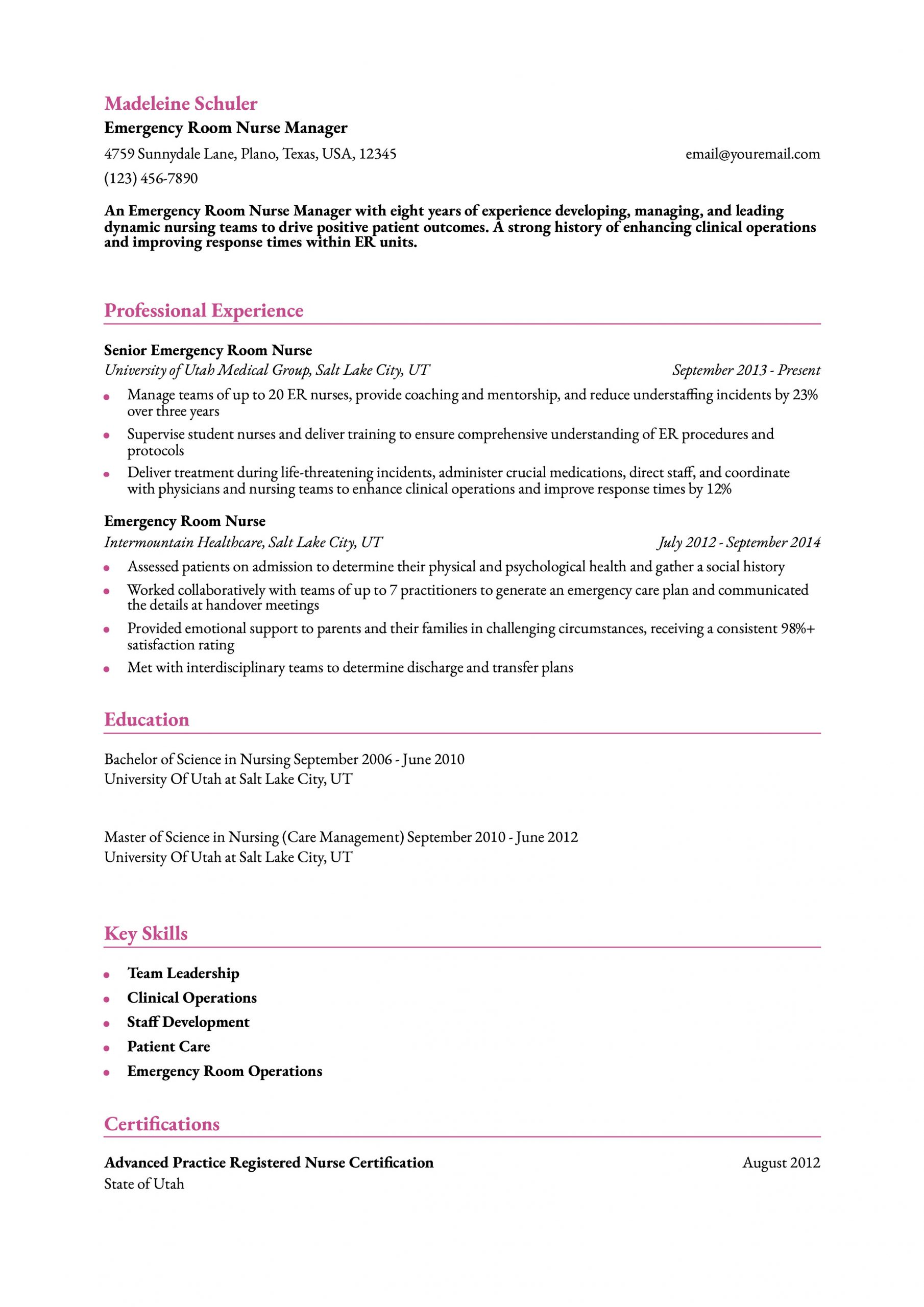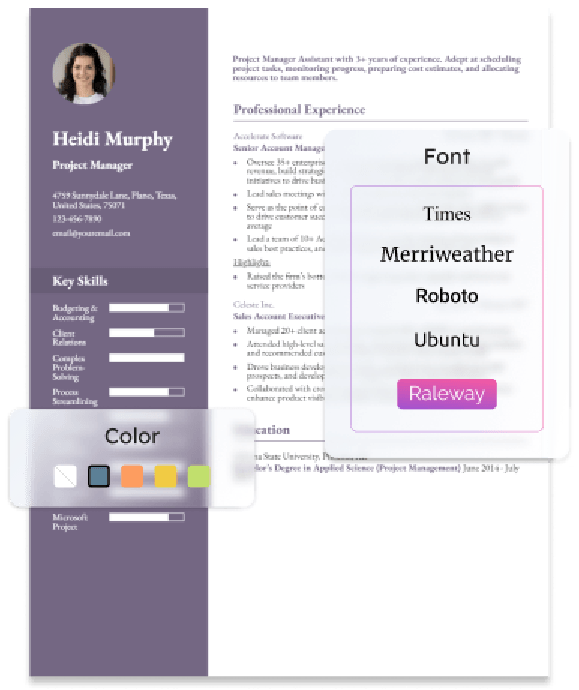To craft a results-driven emergency room (ER) nurse resume, showcase your health care achievements and experience delivering patient-centered care in high-volume hospital environments. Emphasize your ability to drive positive patient outcomes, improve the patient experience, and enhance clinical operations. This guide will provide valuable insights to help you translate the most compelling aspects of your nursing experience into a powerful resume.
Most Popular Emergency Room Nurse Resumes
Emergency Room Nurse Resume
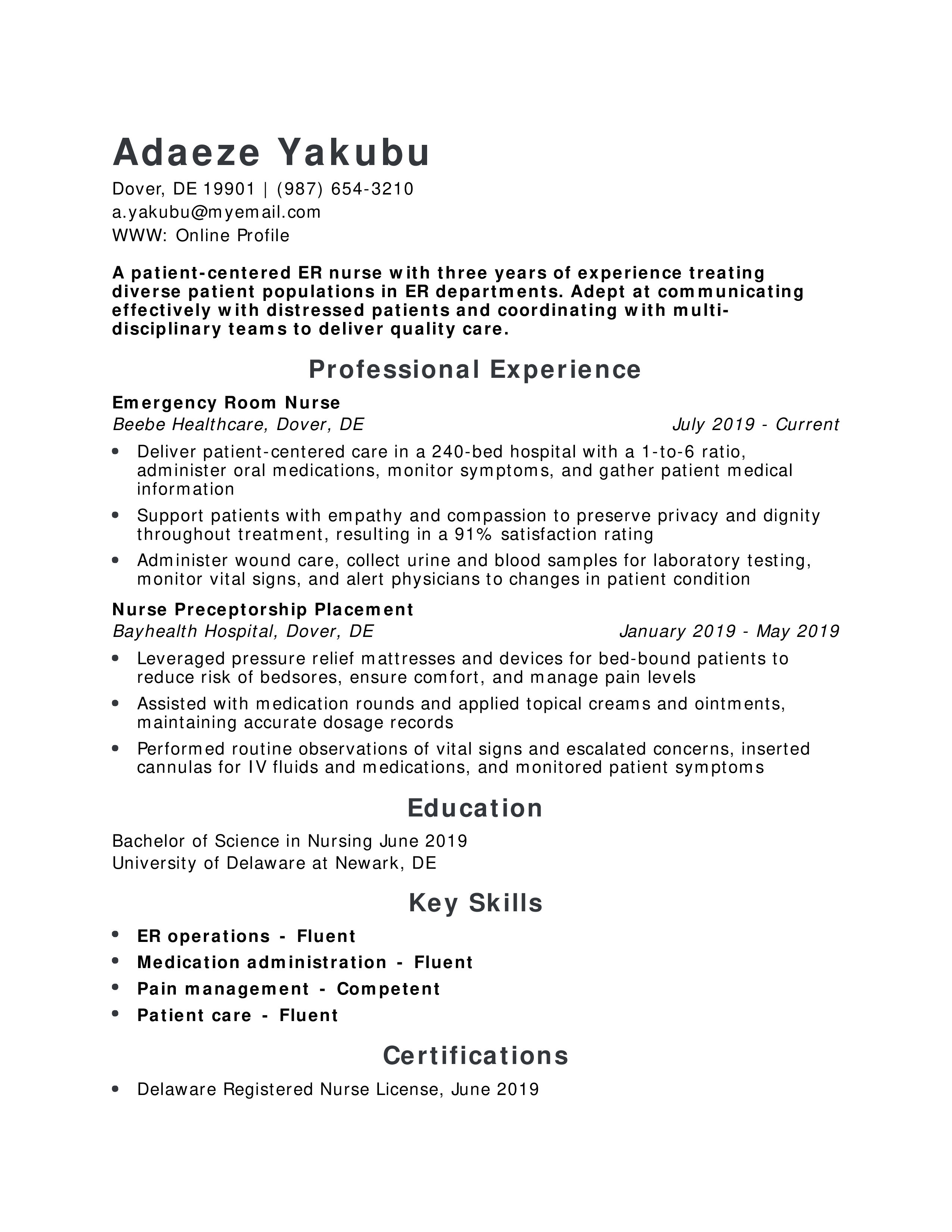
Why This Resume Is a Great Example
Adaeze’s resume highlights her ability to provide compassionate, patient-centered care in high-pressure ER settings. Her quantified patient satisfaction rating and clear descriptions of her responsibilities demonstrate her clinical expertise and dedication.
Key Tips: Quantify results: Including measurable metrics, like her 91% patient satisfaction rating, showcases her impact in patient care. Focus on relevant skills: Highlighting pain management and ER operations makes her qualifications stand out.
For more tips on writing an effective resume, check out: How To Make a Resume
Emergency Room Nurse Manager Resume
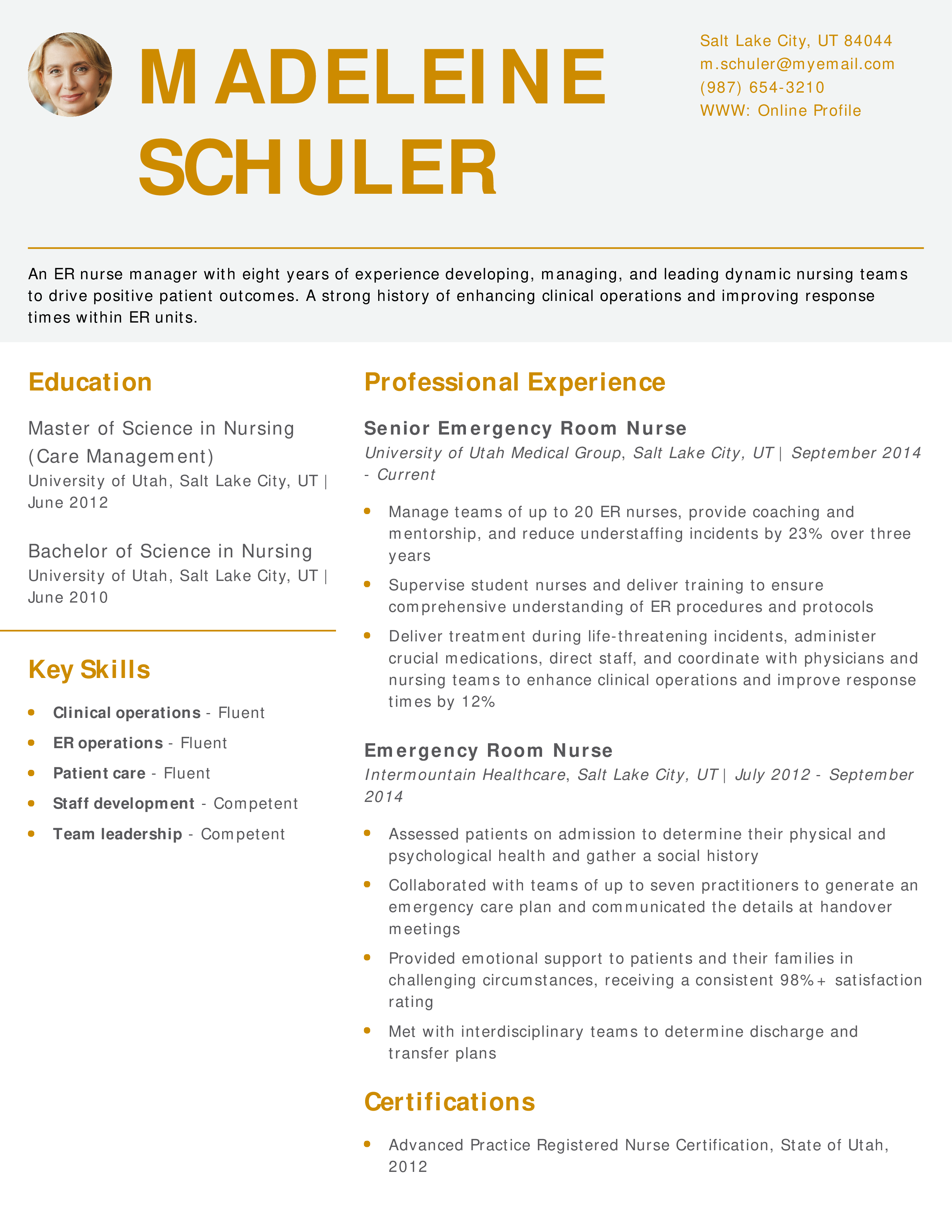
Why This Resume Is a Great Example
Madeleine’s resume demonstrates strong leadership and clinical expertise in emergency nursing. Her ability to train, mentor, and manage ER teams is clearly highlighted, making her a strong candidate for a nurse manager role.
Key Tips: Highlight leadership skills: Madeleine effectively showcases her ability to manage teams and improve operations. Show impact with data: Reducing understaffing incidents by 23% and improving response times by 12% reinforces her ability to enhance patient care.
For more insights on crafting a strong resume, visit: Best Resume Formats
Senior Emergency Room Nurse Resume
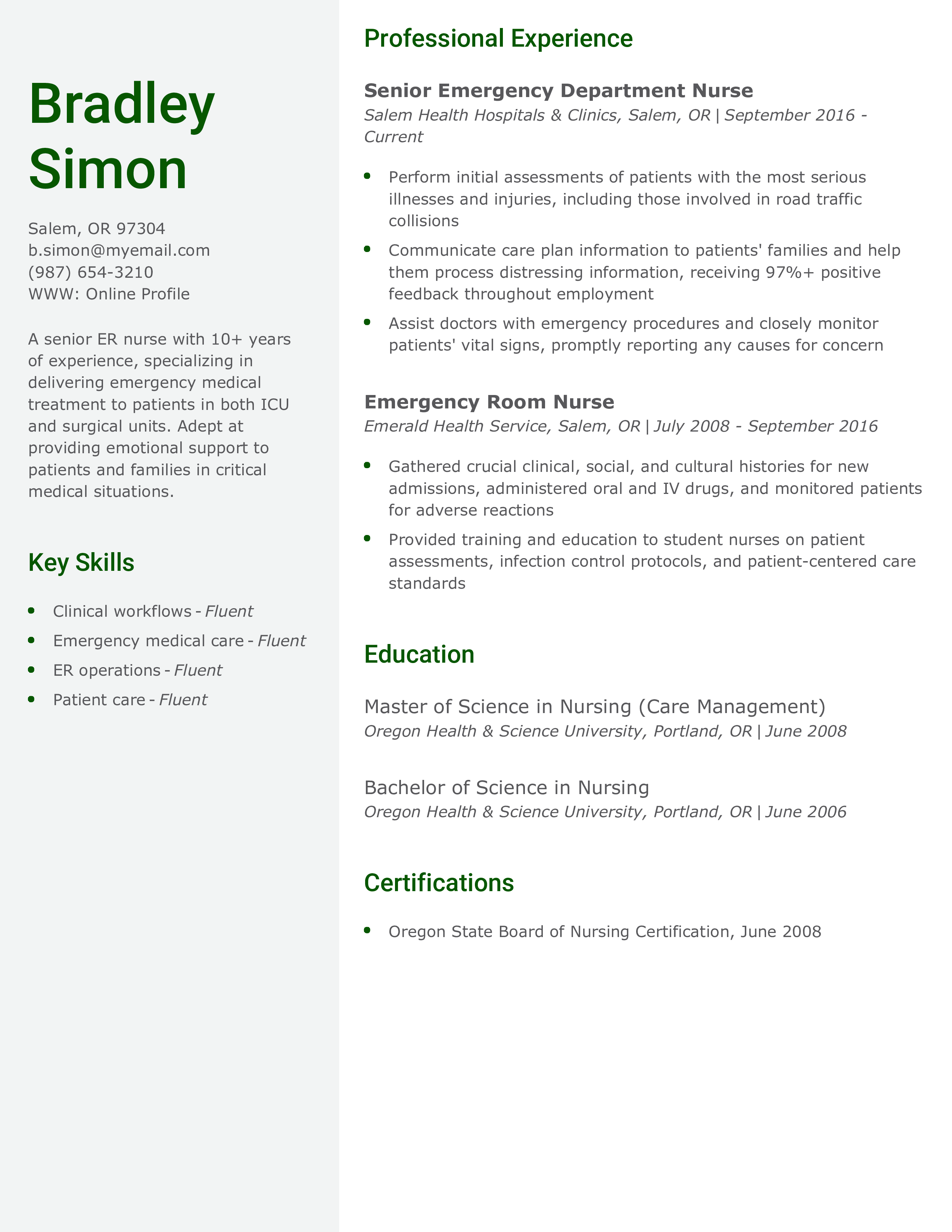
Why This Resume Is a Great Example
Bradley’s resume highlights his extensive experience in emergency nursing and his ability to handle critical medical situations. His role in training student nurses and assisting doctors demonstrates his leadership and expertise.
Key Tips: Emphasize mentorship: His training of student nurses adds value to his leadership abilities. Highlight specialized skills: Experience in both ICU and surgical units sets him apart from other candidates.
For more guidance on structuring your resume, check out: Resume Skills
Trauma Nurse Resume
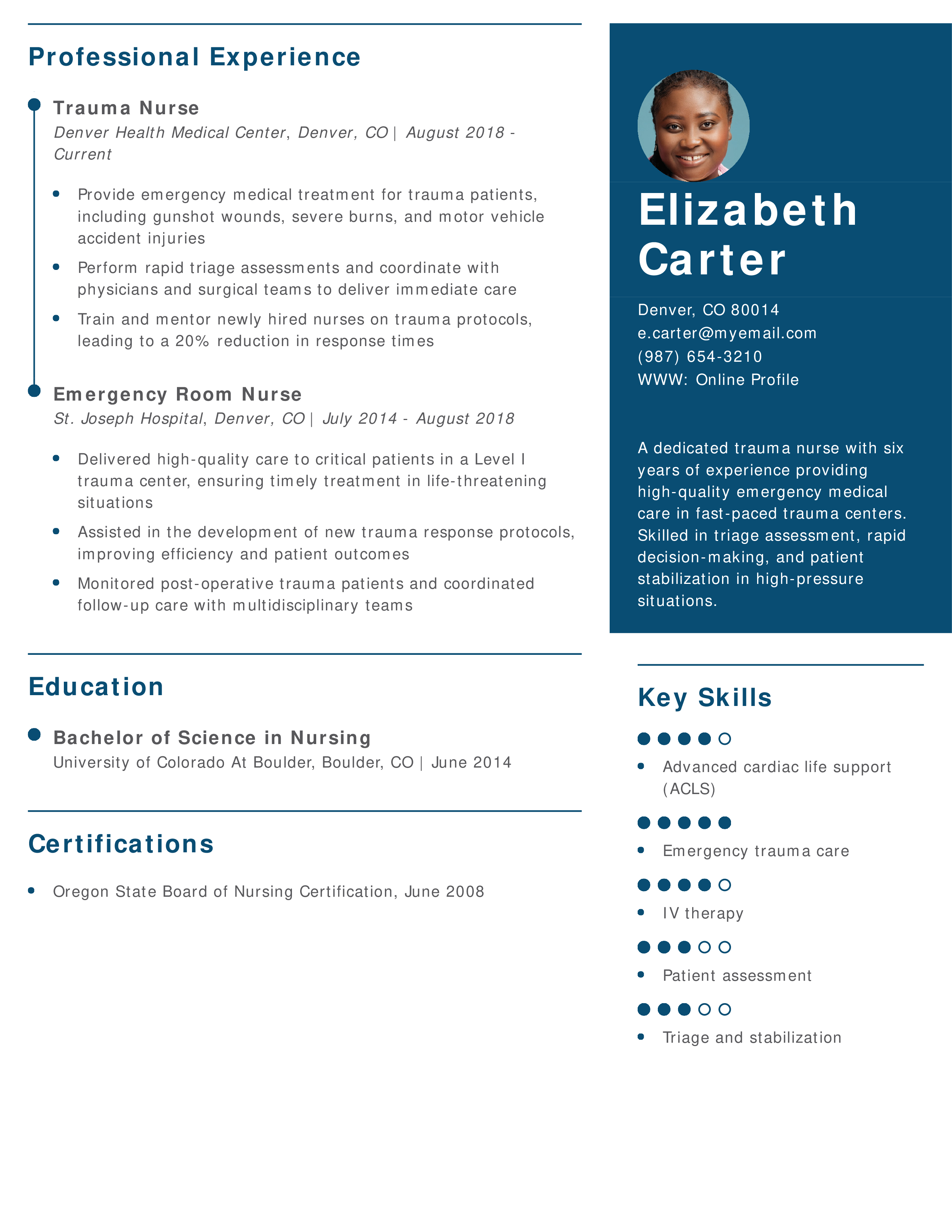
Why This Resume Is a Great Example
Elizabeth’s resume showcases her expertise in high-stakes trauma care, emphasizing her ability to perform under pressure. The inclusion of quantifiable metrics, such as a 20% reduction in response times, strengthens her candidacy.
Key Tips: Highlight specialized skills: Trauma nurses require advanced training in ACLS and TNCC, both of which are listed in Elizabeth’s resume. Use strong action verbs: Her experience section uses action-oriented language to show her role in patient care and protocol improvements.
For more resume-building strategies, check out: Best Resume Formats
Flight Nurse Resume
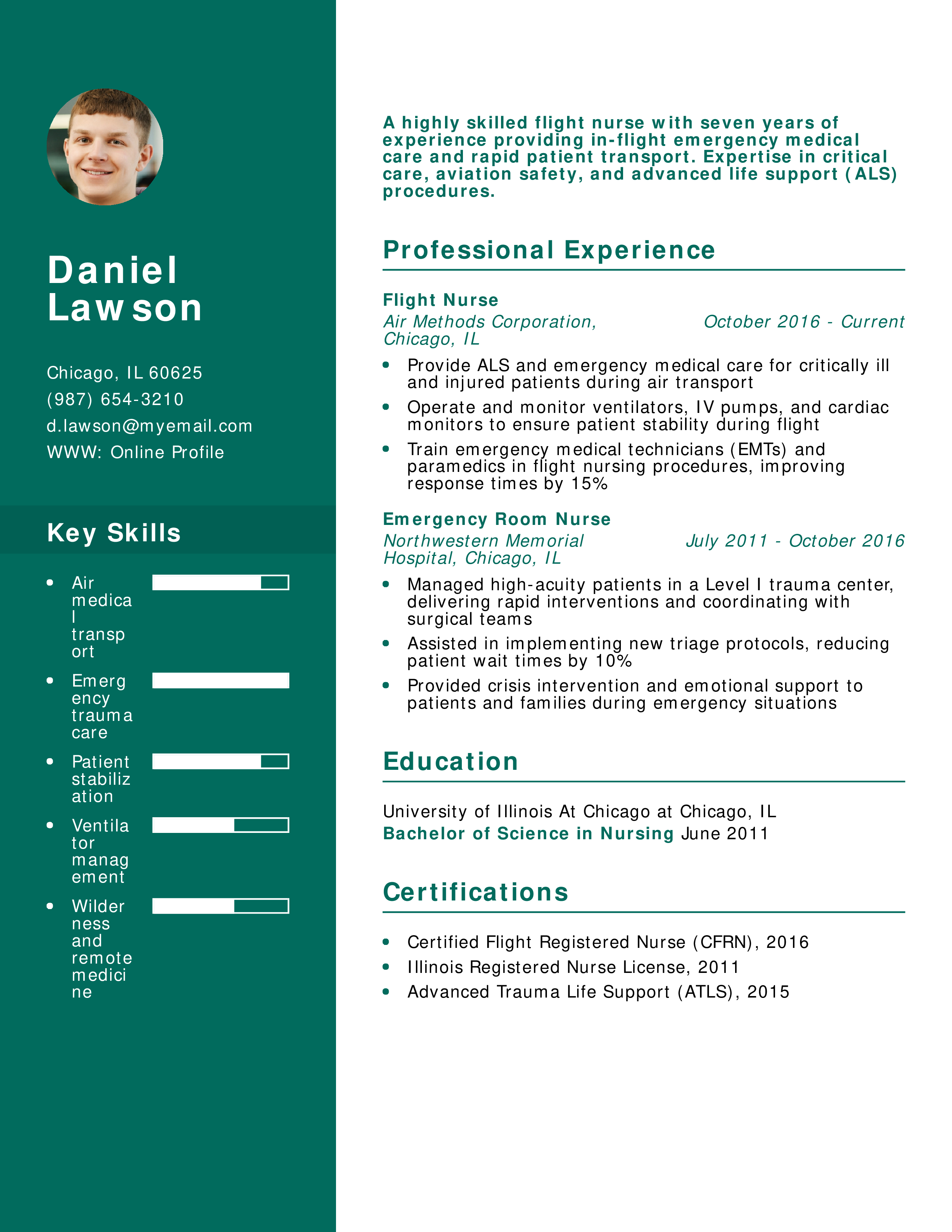
Why This Resume Is a Great Example
Daniel’s resume highlights his unique role in air medical transport, emphasizing both his critical care expertise and his ability to function in high-pressure environments. The inclusion of relevant certifications further strengthens his qualifications.
Key Tips: Focus on specialized experience: Flight nurses need highly specific skills, which Daniel showcases effectively. Highlight leadership: His role in training EMTs and paramedics adds depth to his experience.
For additional resume-writing guidance, visit: Resume Skills
Pediatric ER Nurse Resume
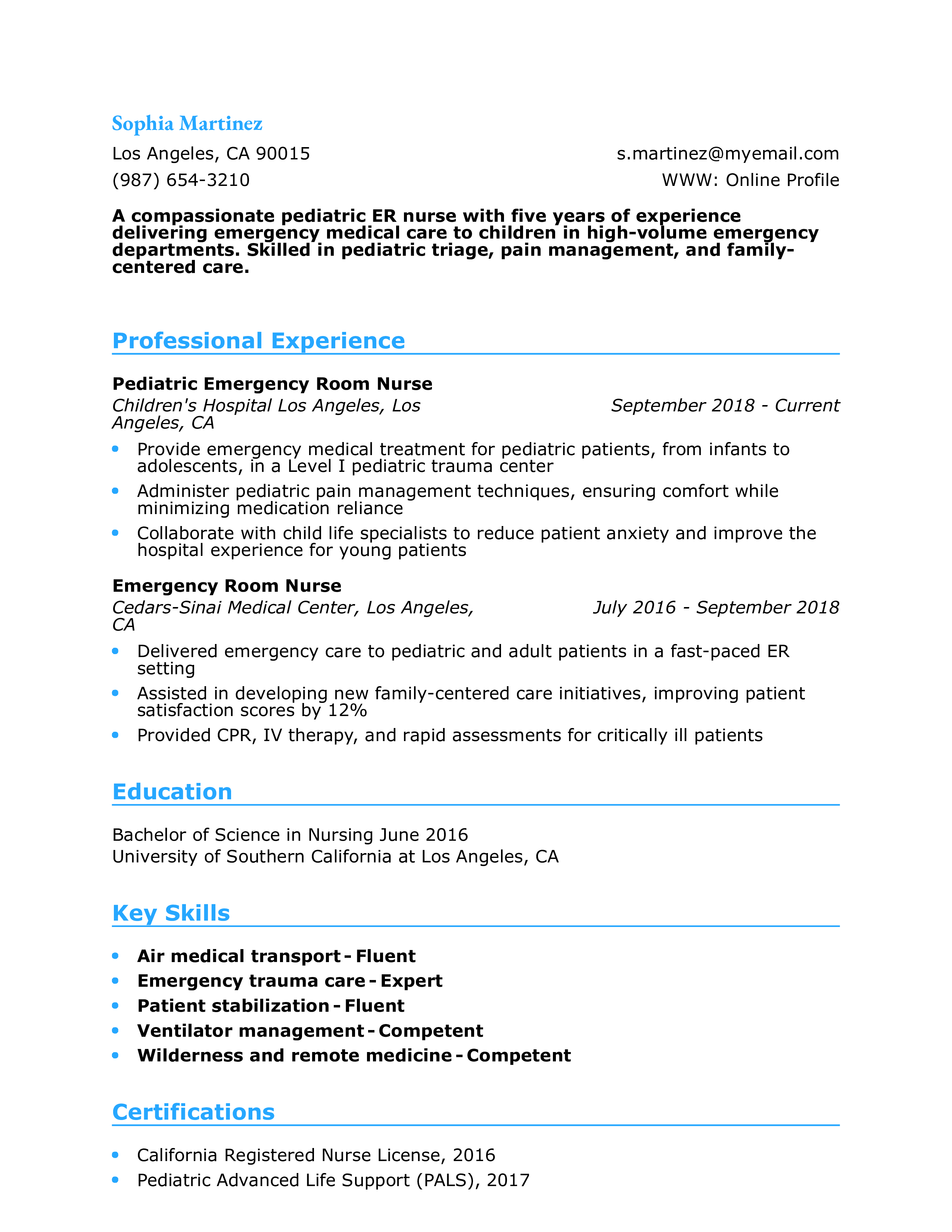
Why This Resume Is a Great Example
Sophia’s resume effectively highlights her specialization in pediatric emergency care, emphasizing both technical skills and her ability to provide compassionate support to children and families.
Key Tips: Showcase patient-centered skills: Family-centered care is crucial in pediatric nursing, and Sophia’s experience highlights this well. Use measurable results: Her contribution to patient satisfaction improvements strengthens her resume.
For more guidance on showcasing relevant skills, visit: Soft Skills for Resume
Trauma ICU Nurse Resume
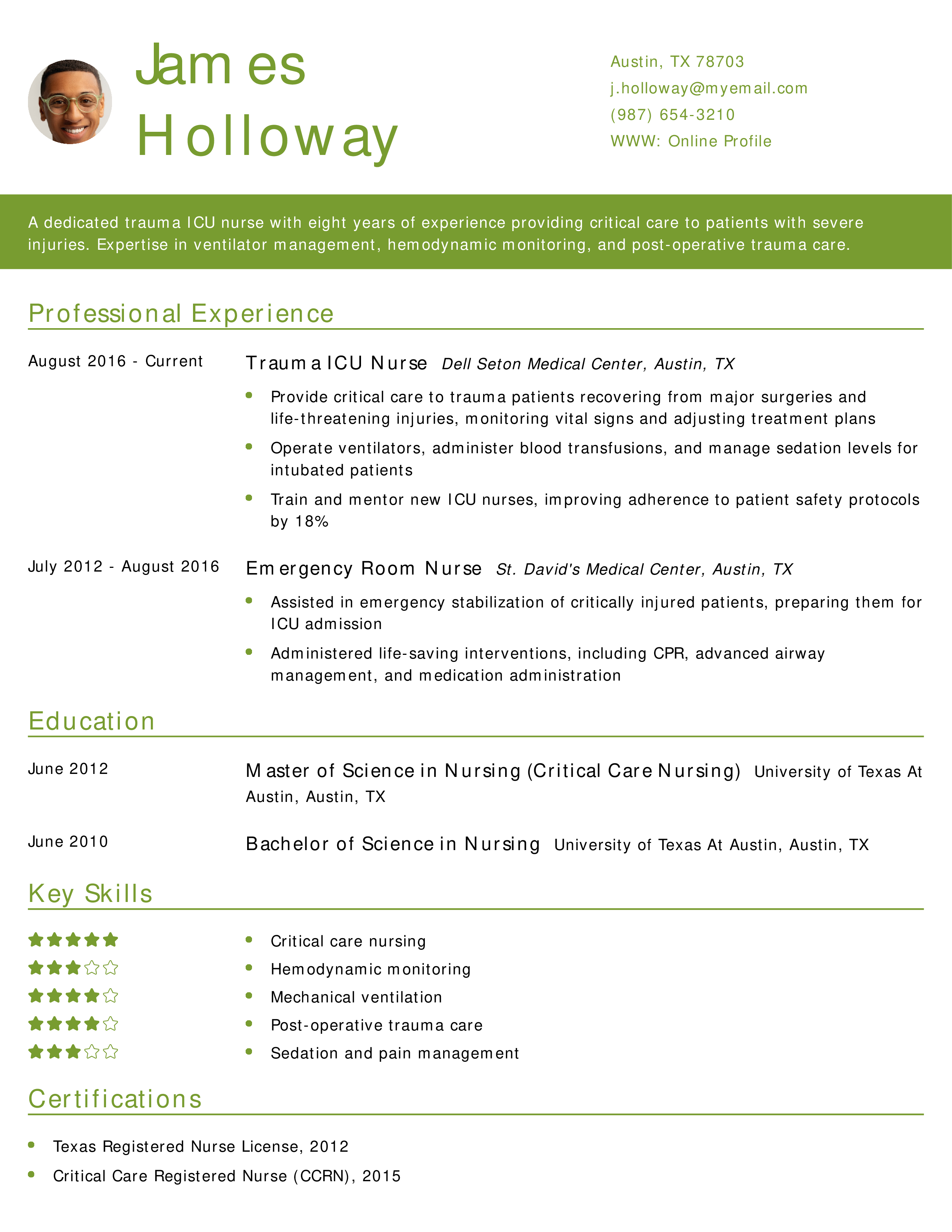
Why This Resume Is a Great Example
James’s resume highlights his expertise in trauma intensive care, demonstrating his ability to manage critical patients. His leadership role in mentoring new ICU nurses strengthens his profile.
Key Tips: Show expertise in critical care: His resume effectively conveys his ability to manage ventilated and post-operative patients. Include measurable achievements: Improving adherence to safety protocols by 18% quantifies his impact.
For more insights on structuring a strong resume, visit: Best Resume Formats
Emergency Triage Nurse Resume

Why This Resume Is a Great Example
Lauren’s resume emphasizes her ability to efficiently assess and prioritize patients in emergency settings. Her contributions to reducing wait times and improving ER workflow make her a strong candidate.
Key Tips: Highlight efficiency improvements: Her role in reducing wait times by 20% adds value. Showcase decision-making skills: Triage nurses must make quick and accurate assessments, which Lauren demonstrates well.
For more resume-writing advice, check out: Resume Skills
Rapid Response Nurse Resume
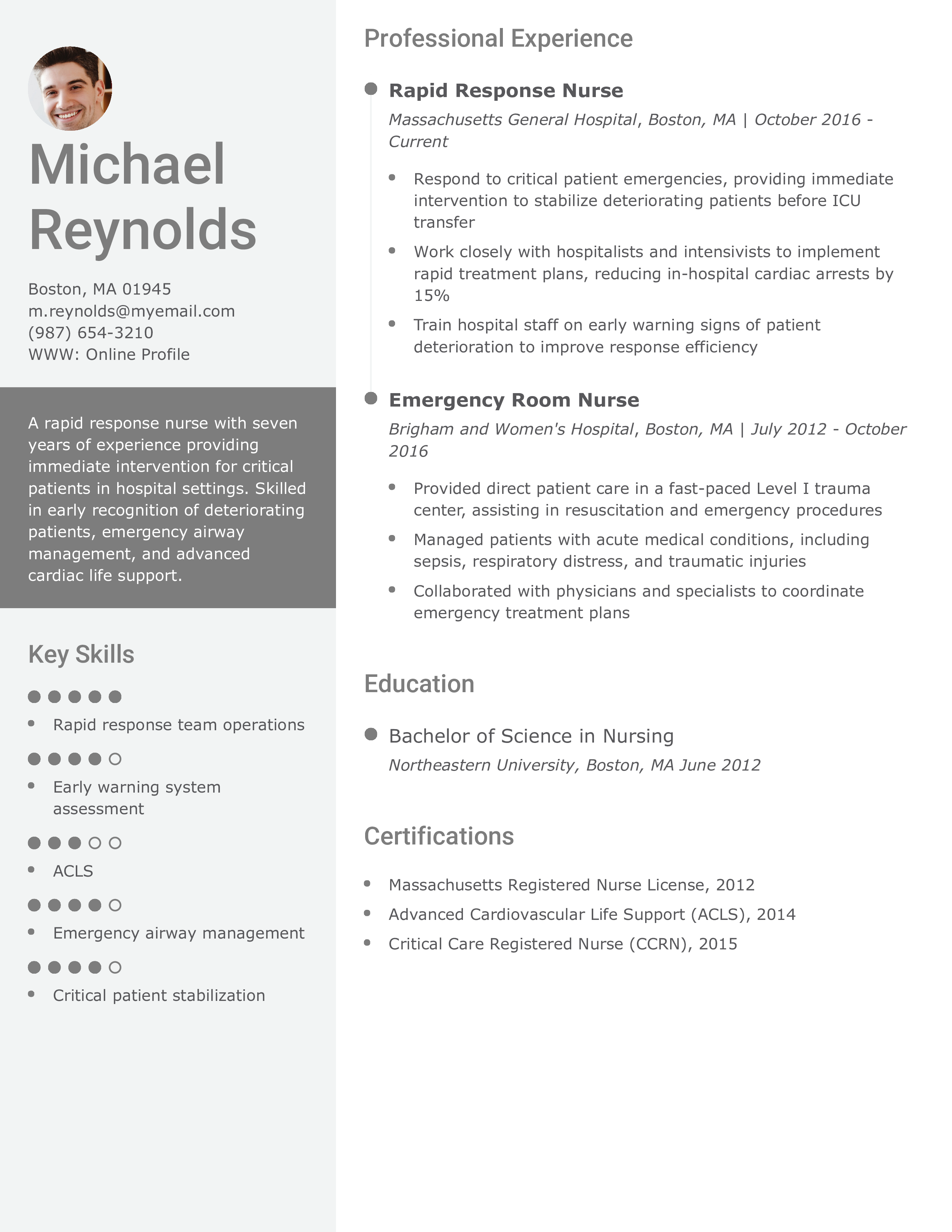
Why This Resume Is a Great Example
Michael’s resume highlights his expertise in rapid patient stabilization and emergency intervention. His contribution to reducing in-hospital cardiac arrests strengthens his qualifications.
Key Tips: Quantify achievements: His impact on reducing cardiac arrests by 15% showcases his effectiveness. Emphasize specialized training: His ACLS and CCRN certifications highlight his advanced skills.
For expert resume formatting tips, visit: Best Resume Formats
Critical Care Transport Nurse Resume
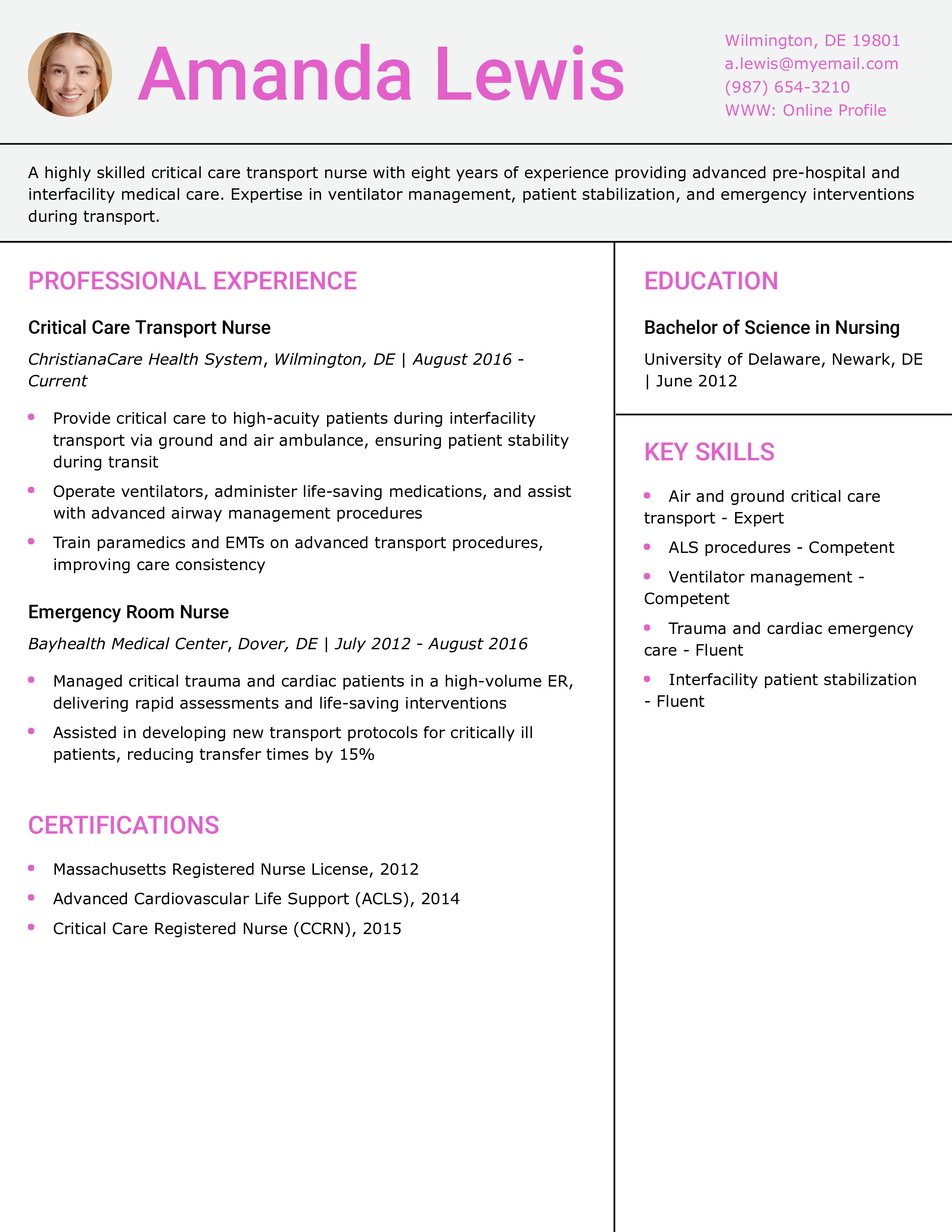
Why This Resume Is a Great Example
Amanda’s resume effectively showcases her expertise in patient transport, displaying her ability to provide emergency care under unique and high-pressure circumstances.
Key Tips: Highlight specialized experience: Critical care transport requires unique skills in stabilization and ventilator management. Show leadership: Her role in training paramedics adds value to her resume.
For more resume-writing strategies, check out: Resume Skills
Emergency Department Charge Nurse Resume
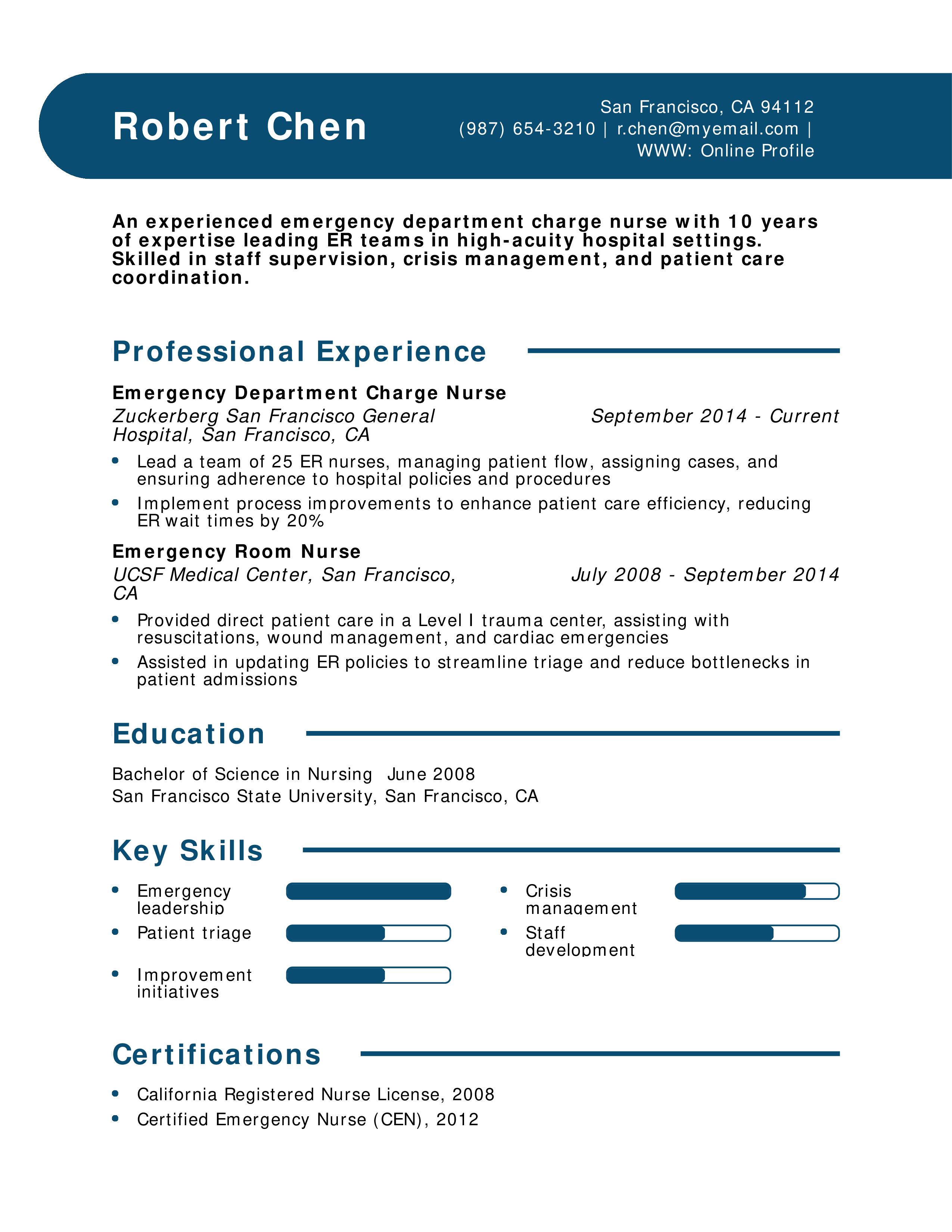
Why This Resume Is a Great Example
Robert’s resume demonstrates his leadership capabilities in the ER setting. His ability to improve patient flow and train new nurses makes him a valuable candidate for charge nurse roles.
Key Tips: Highlight leadership experience: Managing ER teams and improving workflow efficiency strengthens his resume. Showcase measurable outcomes: Reducing ER wait times by 20% is a strong, quantifiable achievement.
For more tips on structuring your resume, visit: Best Resume Formats
Emergency Nurse Practitioner Resume
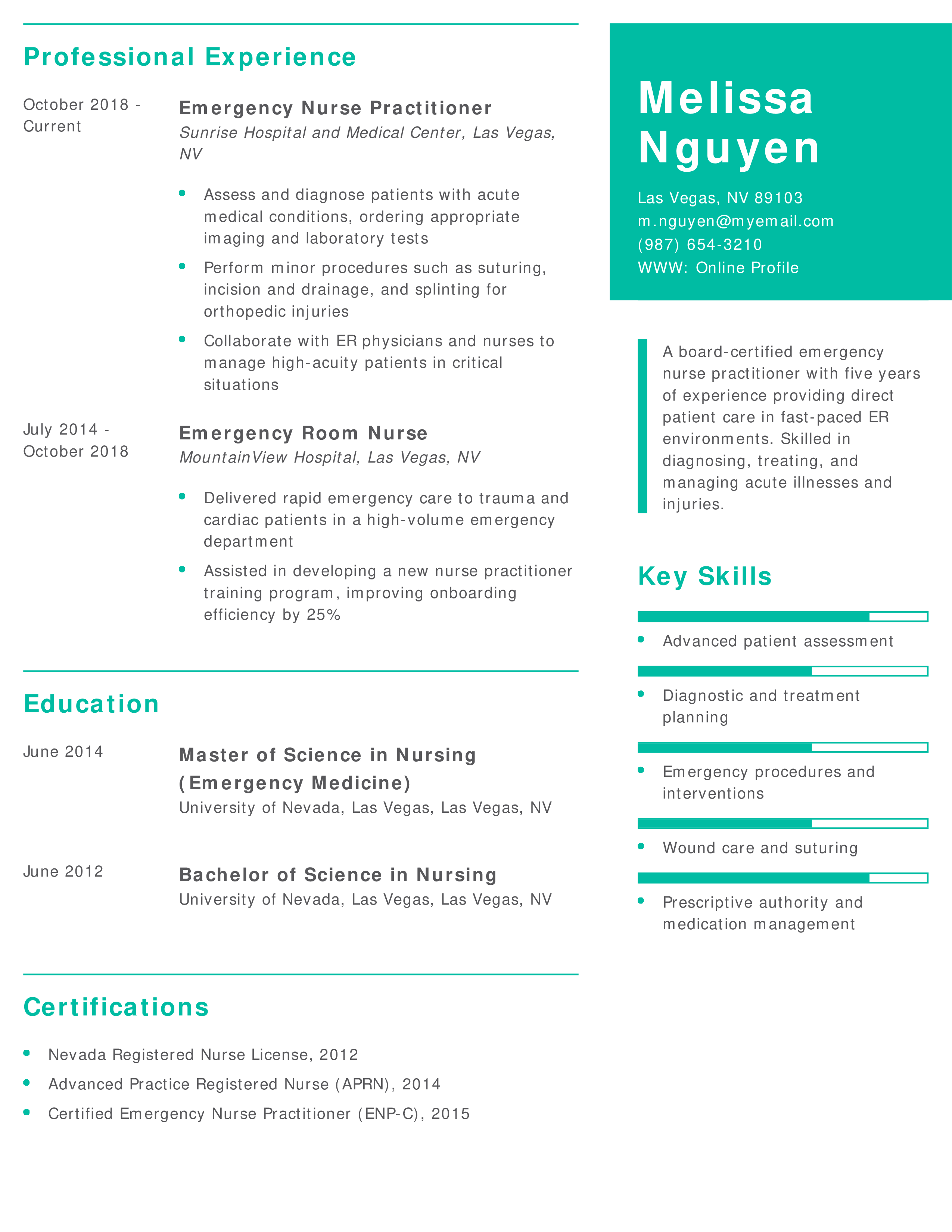
Why This Resume Is a Great Example
Melissa’s resume highlights her advanced clinical expertise as a nurse practitioner in the ER. Her contributions to training new NPs add value to her leadership skills.
Key Tips: Emphasize advanced skills: Nurse practitioners need to demonstrate diagnostic and treatment abilities. Showcase contributions to hospital improvements: Her role in developing training programs strengthens her profile.
For more guidance on including certifications, visit: How To List Certifications on Resume.
Pediatric Trauma Nurse Resume
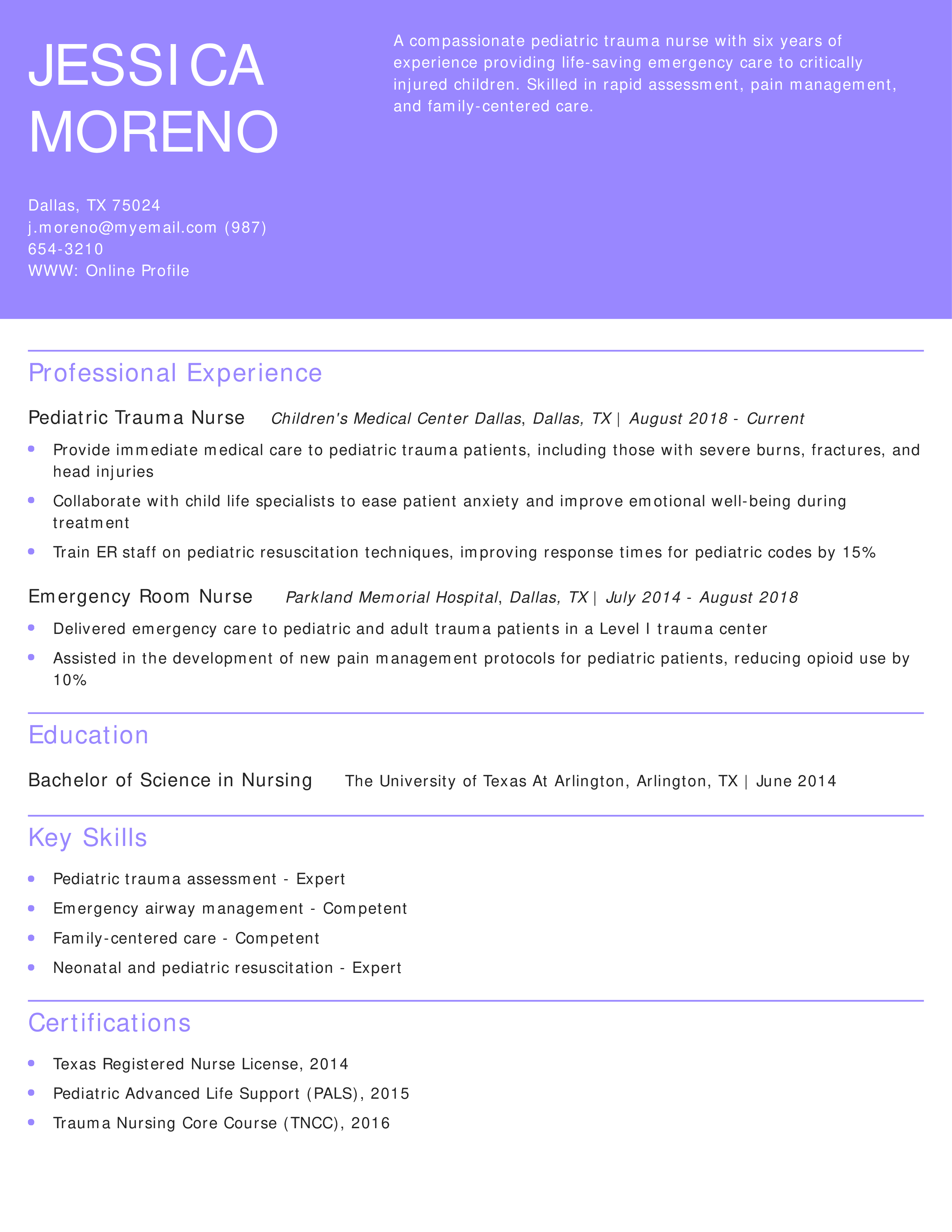
Why This Resume Is a Great Example
Jessica’s resume highlights her expertise in pediatric trauma care, emphasizing her ability to treat critically injured children while providing emotional support to families.
Key Tips: Showcase specialized training: Her PALS and TNCC certifications highlight her pediatric expertise. Quantify improvements: A 15% faster response time for pediatric emergencies demonstrates real impact.
For more resume tips, visit: Best Resume Formats
Disaster Response Nurse Resume
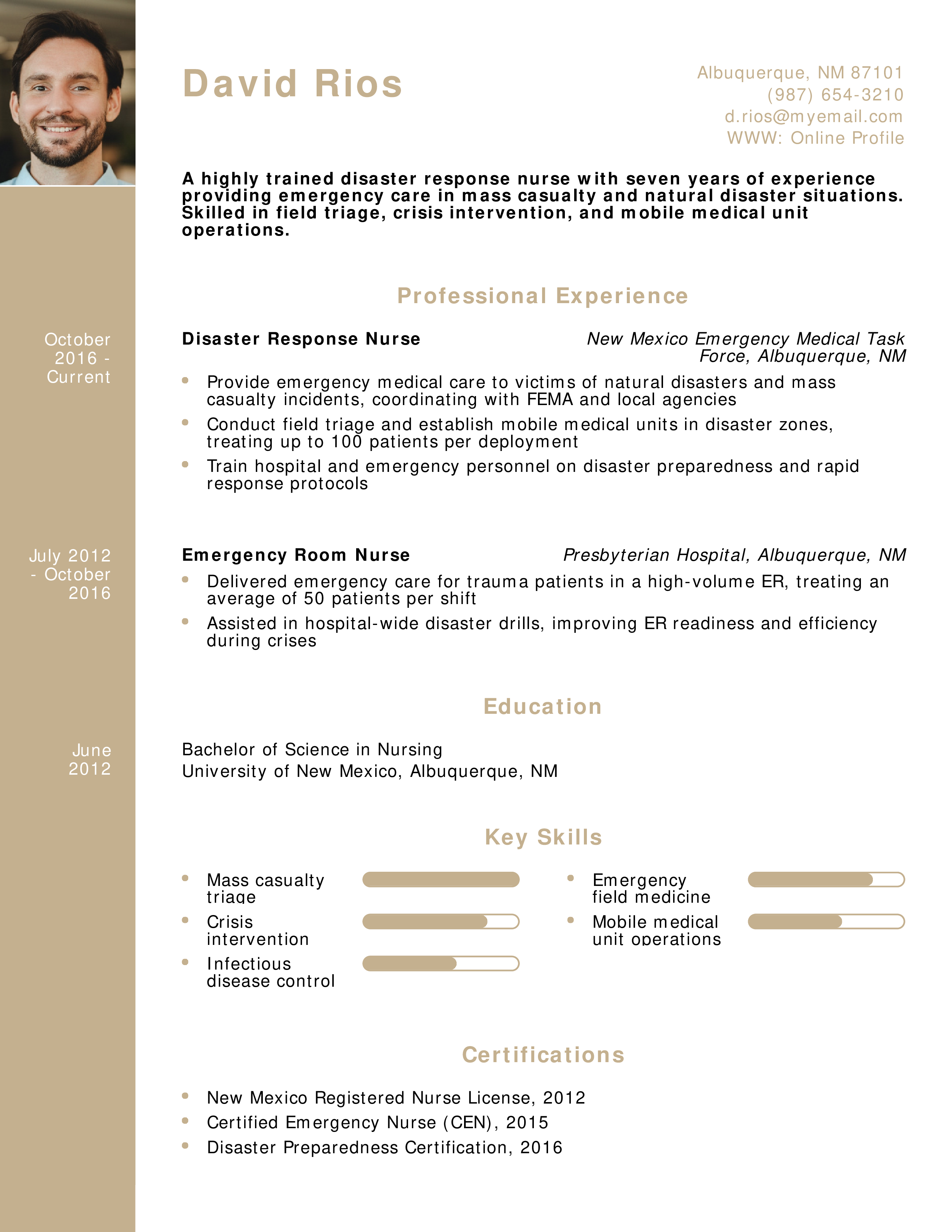
Why This Resume Is a Great Example
David’s resume highlights his ability to operate in high-stress disaster situations. His experience in field triage and crisis response makes him a valuable asset for emergency teams.
Key Tips: Emphasize specialized experience: Disaster response nursing requires unique skills beyond traditional ER care. Highlight large-scale impact: His role in treating 100+ patients per deployment showcases his ability to handle mass casualty events.
For additional resume insights, check out: Resume Skills
Emergency Flight Paramedic Nurse Resume
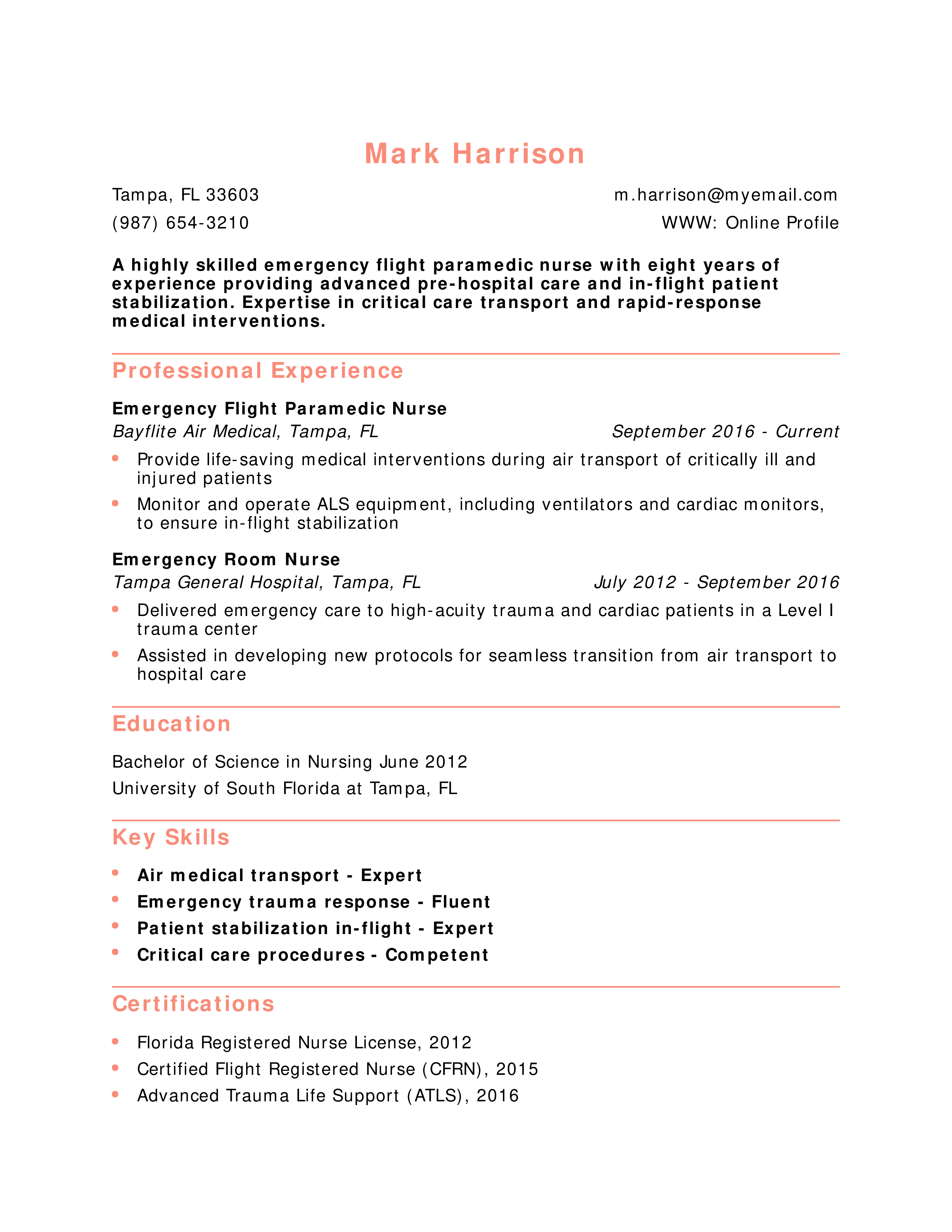
Why This Resume Is a Great Example
Mark’s resume highlights his expertise in emergency flight nursing, showcasing his ability to provide rapid, critical care in high-risk transport situations.
Key Tips: Emphasize teamwork: Flight nurses must work closely with paramedics and hospital teams. Show impact: His training initiatives demonstrate leadership and expertise.
For more resume-building strategies, check out: How To List Certifications on Resume.
Emergency Nurse Educator Resume
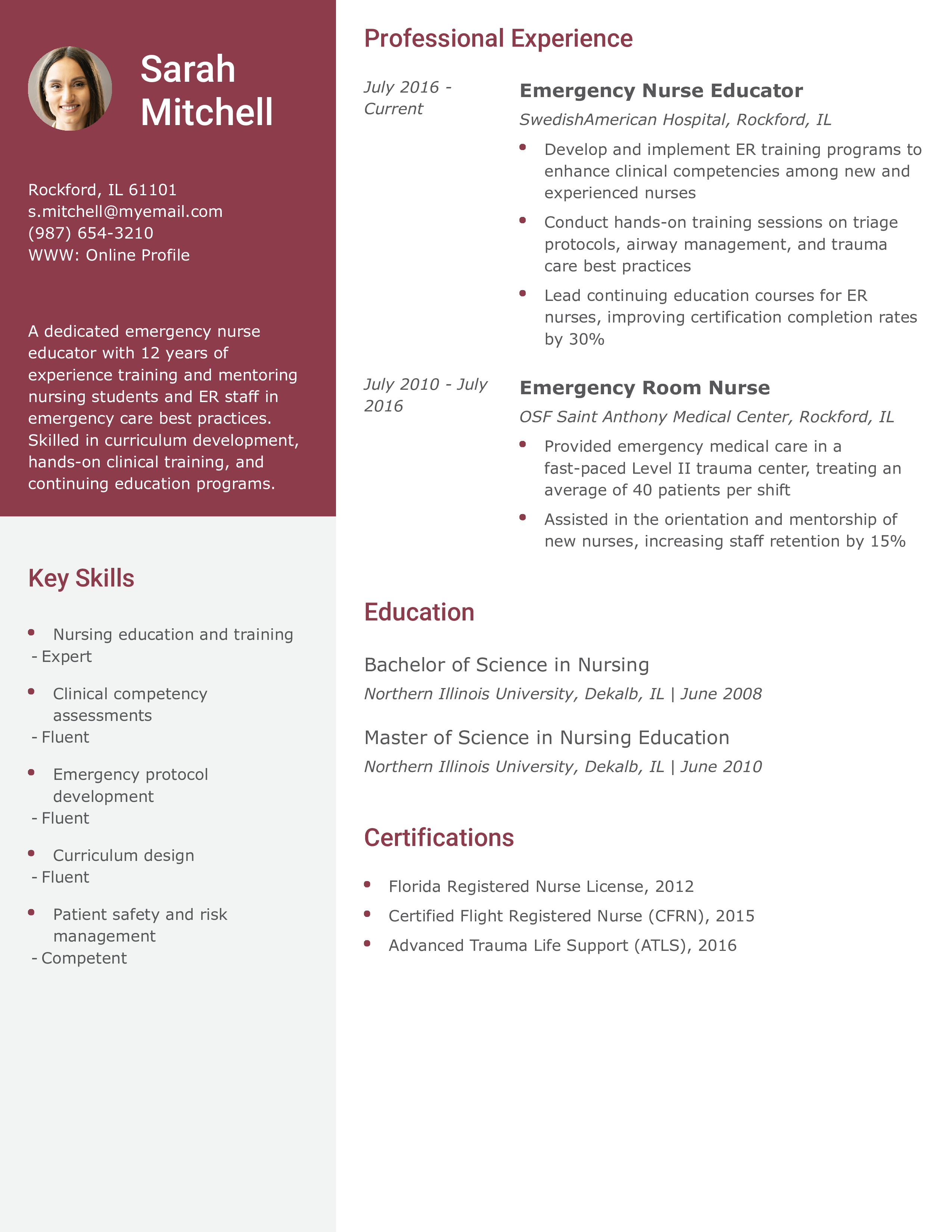
Why This Resume Is a Great Example
Sarah’s resume highlights her expertise in both emergency care and education, making her an excellent candidate for nurse educator roles. Her leadership in training programs and measurable improvements in certification rates make her stand out.
Key Tips: Showcase training experience: Educators must demonstrate their ability to develop and lead learning programs. Use quantifiable achievements: Increasing certification rates by 30% and improving nurse retention rates add strong value.
For more resume guidance, check out: How To List Certifications on Resume
Emergency Department Case Manager Nurse Resume
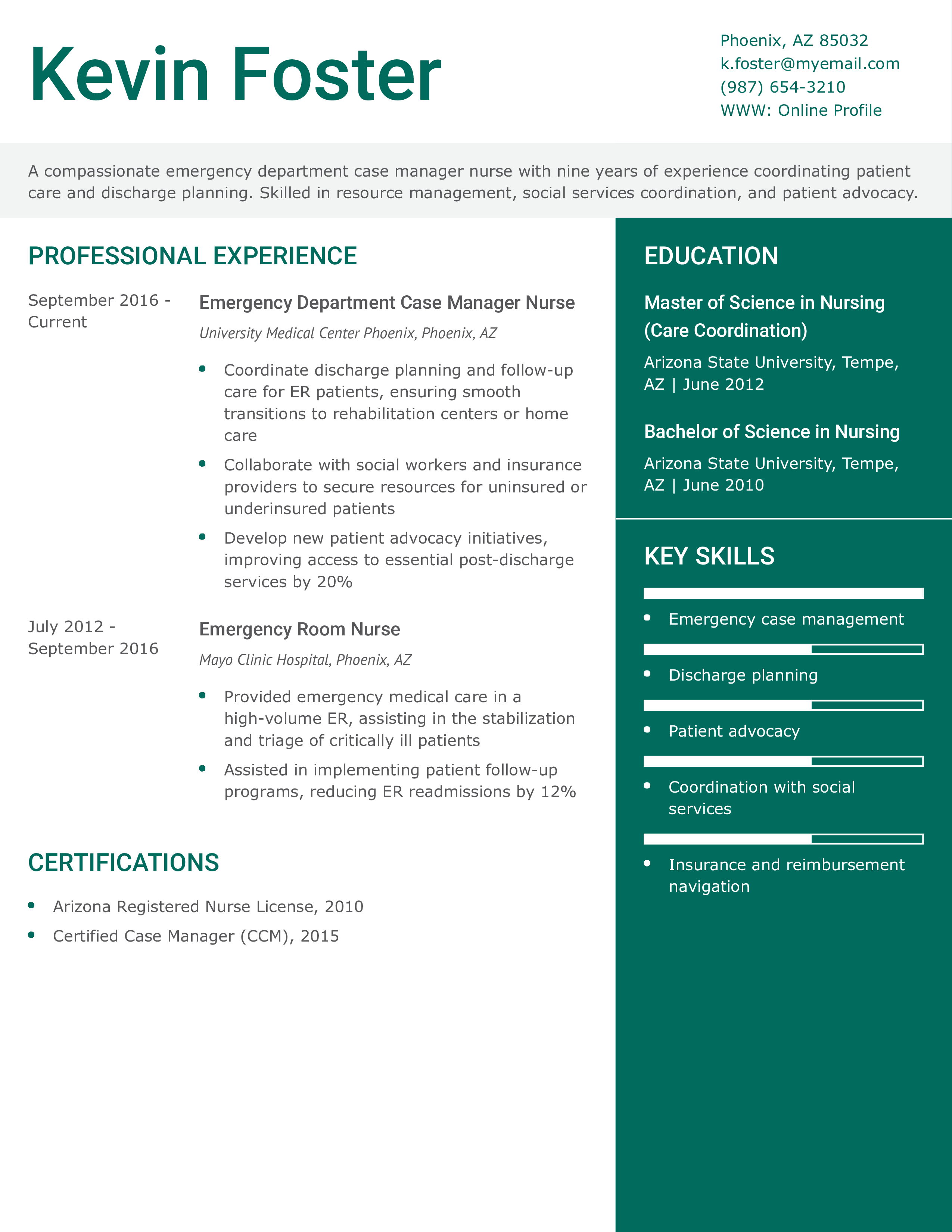
Why This Resume Is a Great Example
Kevin’s resume effectively showcases his ability to manage patient care beyond the ER, ensuring continuity and better outcomes for patients. His focus on advocacy and reducing readmissions strengthens his qualifications.
Key Tips: Emphasize patient-centered care: Case managers play a crucial role in coordinating care, which Kevin highlights well. Use measurable results: His contribution to reducing readmissions and improving post-discharge care access adds impact.
For more resume-building strategies, check out: Resume Skills
Trauma Resuscitation Nurse Resume
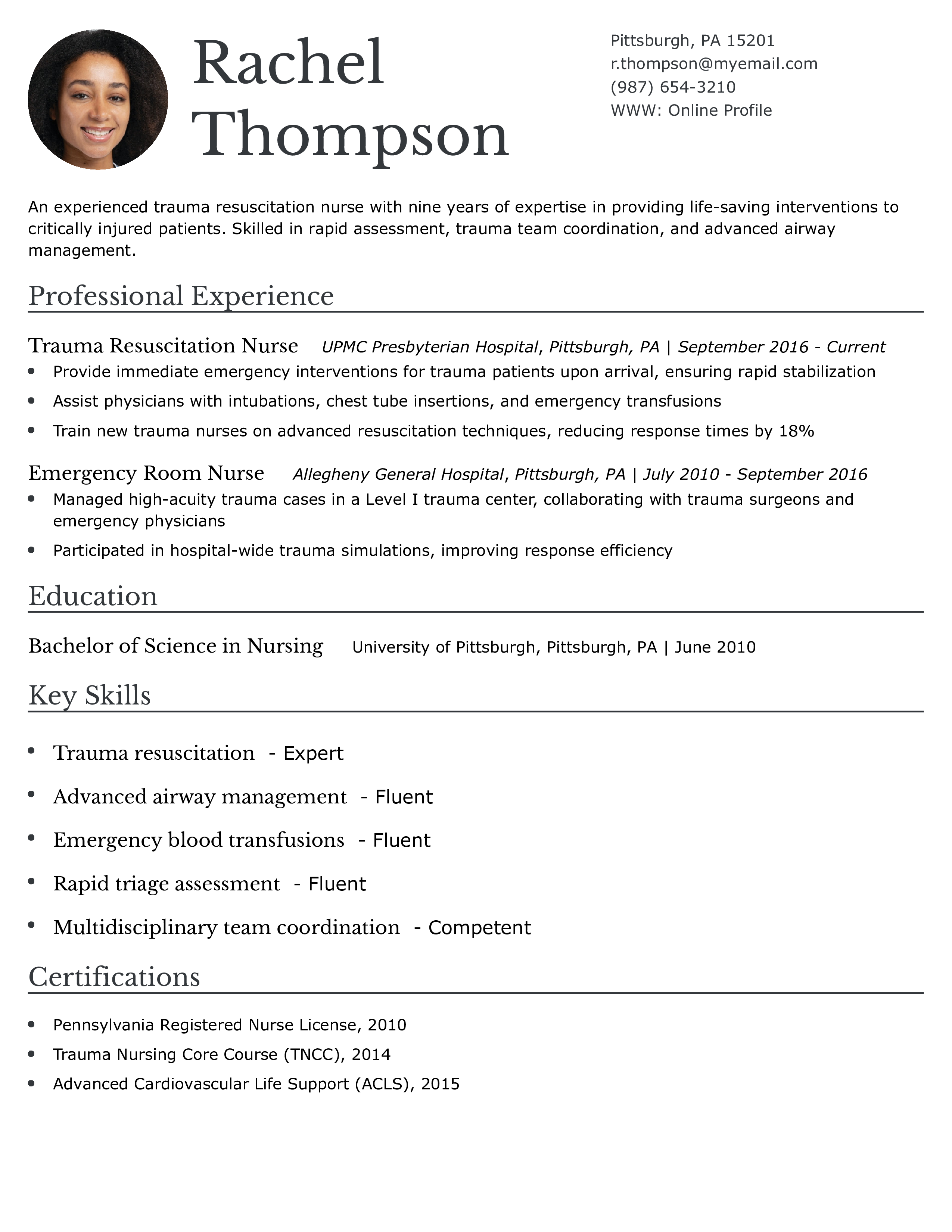
Why This Resume Is a Great Example
Rachel’s resume effectively showcases her expertise in trauma resuscitation, highlighting her ability to act quickly in life-threatening situations.
Key Tips: Use strong action verbs: Terms like "stabilize" and "assist with intubations" show her direct involvement in critical care. Quantify improvements: An 18% reduction in response times emphasizes her effectiveness.
For more tips, visit: Resume Skills
Emergency Burn Unit Nurse Resume

Why This Resume Is a Great Example
Dante’s resume emphasizes his specialized burn care expertise and his contributions to improving treatment protocols.
Key Tips: Highlight niche expertise: Burn care is a specialized field, and Dante’s ABLS certification strengthens his credentials. Show measurable impact: Reducing infection rates by 12% demonstrates the effectiveness of his work.
For more resume insights, visit: Best Resume Formats
Emergency Cardiac Nurse Resume
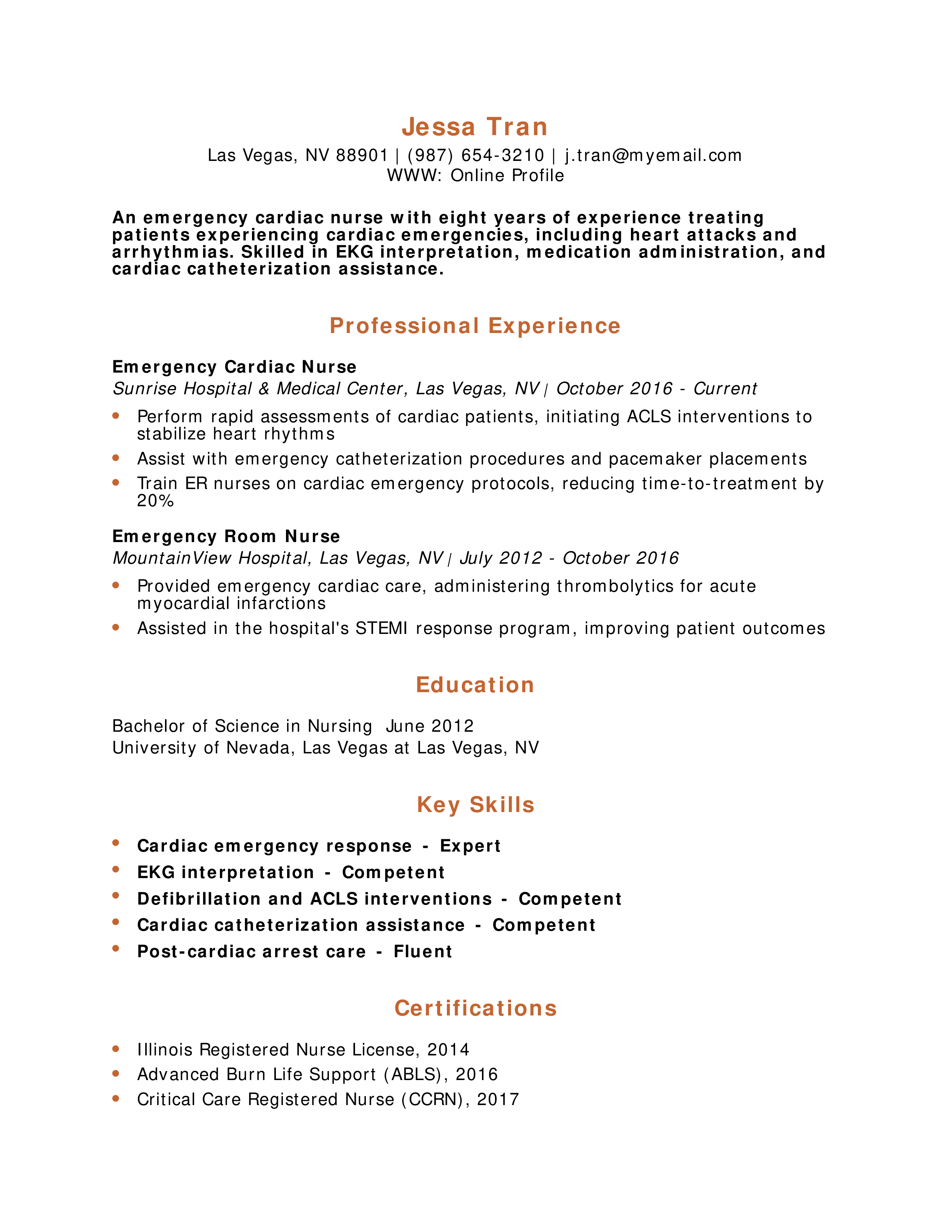
Why This Resume Is a Great Example
Jessa’s resume highlights her expertise in emergency cardiac care, demonstrating her ability to respond quickly in life-threatening situations.
Key Tips: Use specialized terminology: Cardiac nurses should showcase skills like "EKG interpretation" and "defibrillation." Show improvement initiatives: Reducing treatment time by 20% is a strong measurable achievement.
For additional resume guidance, visit: How To List Certifications on Resume
Stroke Response Nurse Resume
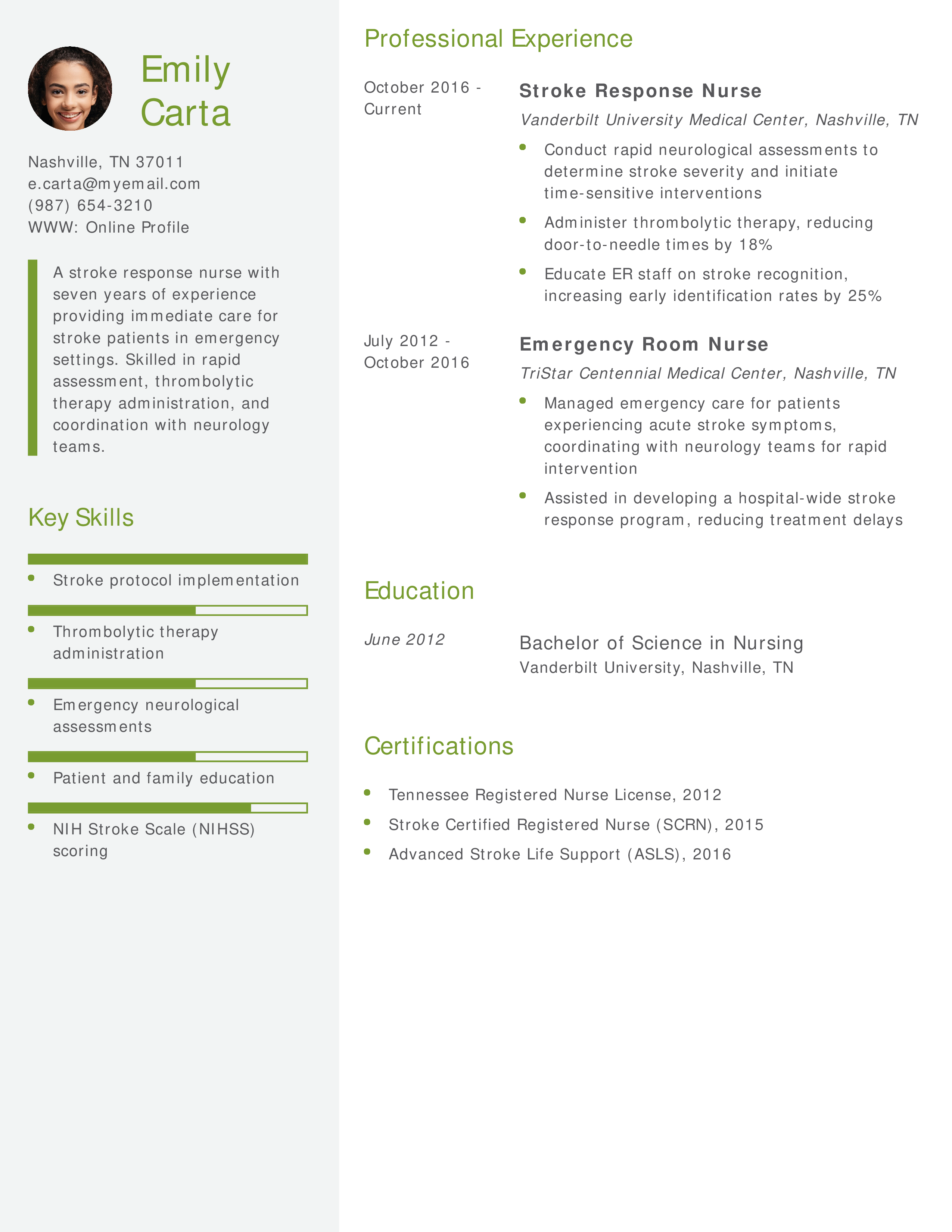
Why This Resume Is a Great Example
Emily’s resume highlights her expertise in emergency stroke care and her ability to improve treatment times, making her a strong candidate for stroke response nursing positions.
Key Tips: Highlight specialized skills: Stroke nurses require expertise in NIHSS scoring and thrombolytic therapy. Show measurable achievements: Reducing door-to-needle times by 18% demonstrates efficiency.
For more resume tips, visit: Resume Skills
Emergency Psychiatric Nurse Resume
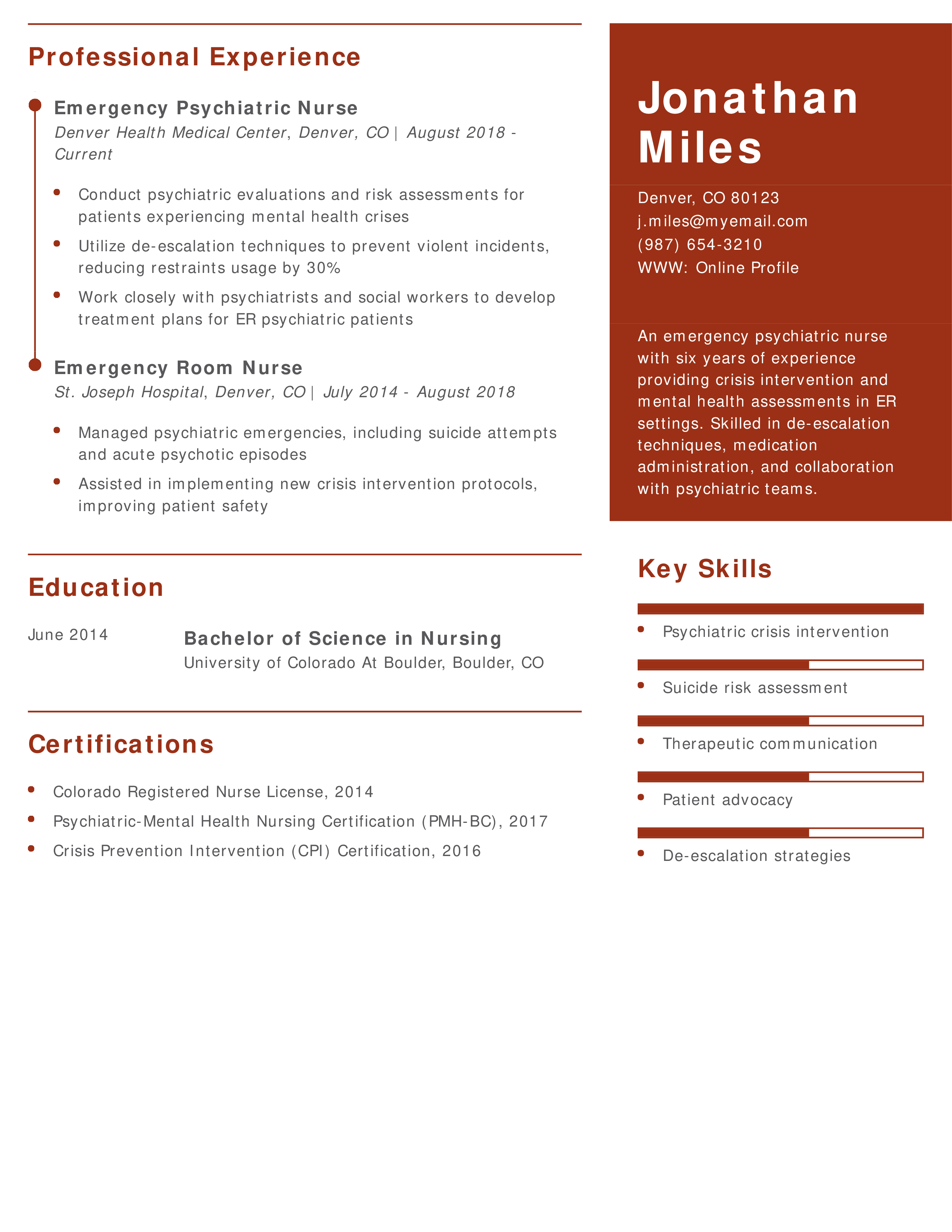
Why This Resume Is a Great Example
Jonathan’s resume effectively highlights his expertise in emergency psychiatric nursing and his ability to manage high-stress situations.
Key Tips: Demonstrate crisis intervention skills: De-escalation and risk assessment are critical in this role. Show measurable impact: Reducing restraint usage by 30% demonstrates his ability to manage psychiatric patients safely.
For expert resume formatting tips, visit: Best Resume Formats
Emergency Nurse Preceptor Resume
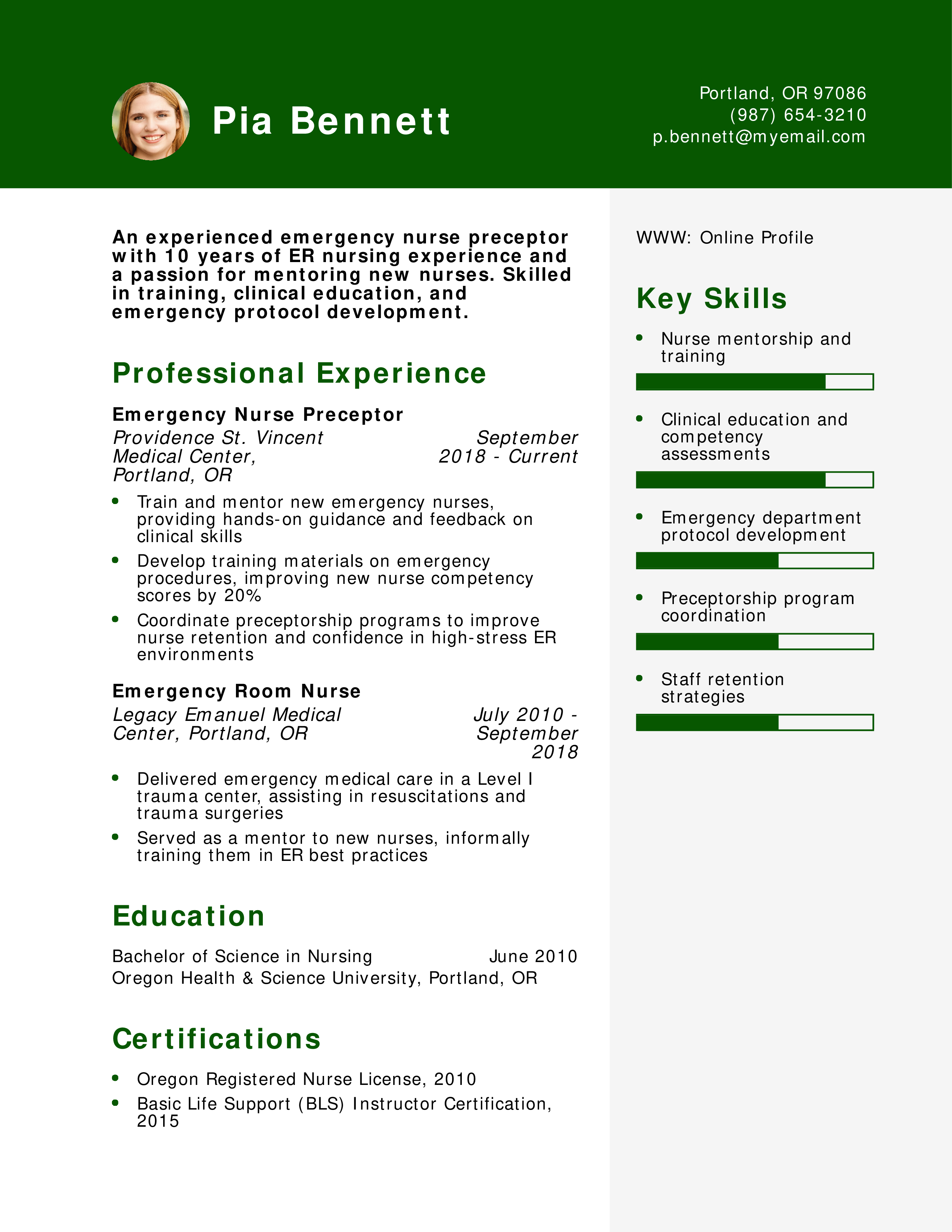
Why This Resume Is a Great Example
Pia’s resume highlights her leadership skills in training and mentoring new ER nurses, making her an ideal candidate for preceptorship roles.
Key Tips: Showcase mentorship experience: Her role in improving competency scores adds value. Highlight leadership: Nurse preceptors must demonstrate their ability to teach and guide new staff.
For additional resume-writing strategies, visit: How To List Certifications on Resume
Travel Emergency Room Nurse Resume
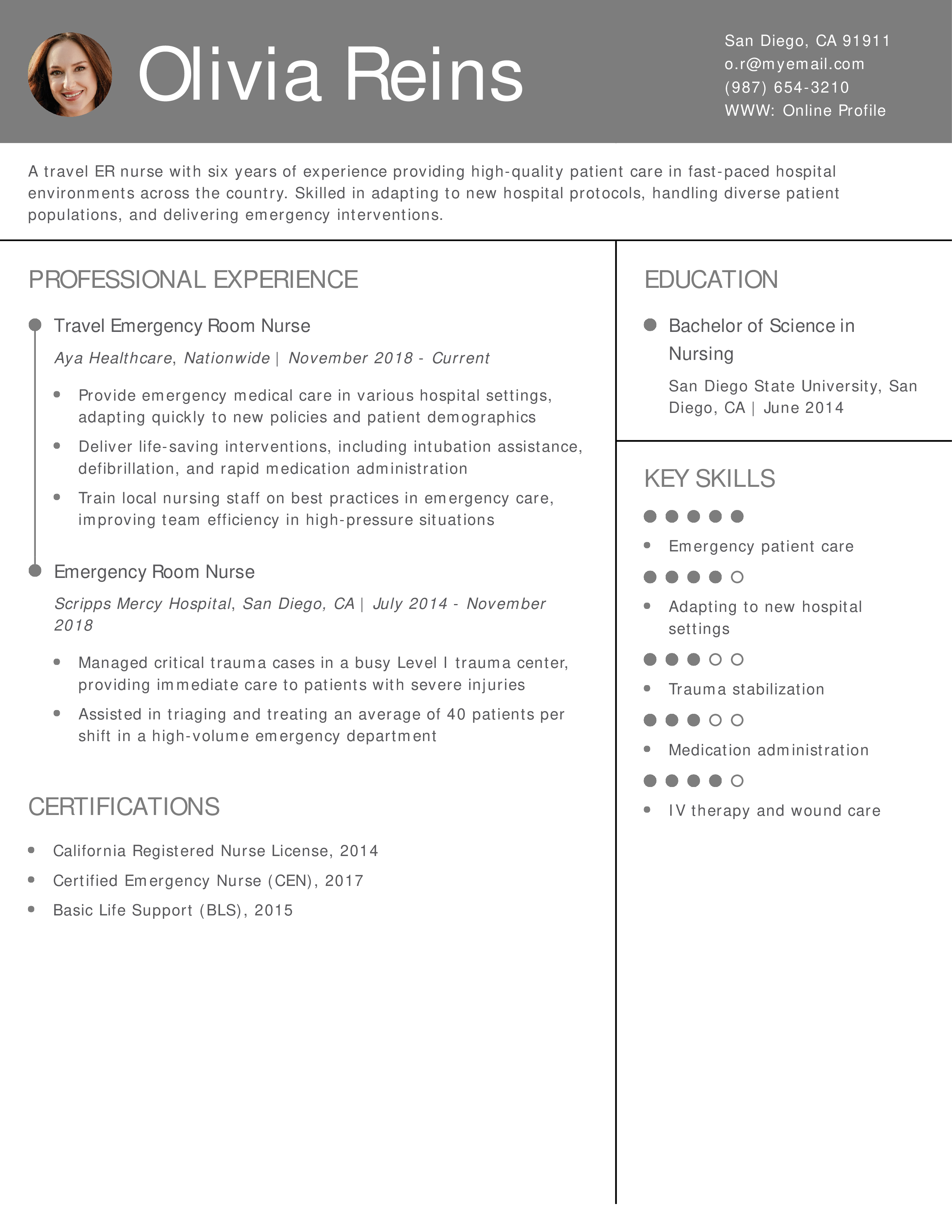
Why This Resume Is a Great Example
Olivia’s resume highlights her ability to adapt to different hospital environments and deliver consistent, high-quality emergency care. Her experience as a travel nurse demonstrates flexibility and expertise.
Key Tips: Showcase adaptability: Travel nurses must quickly adjust to new hospitals, making this a key strength to emphasize. Highlight diverse experience: Working in multiple settings enhances problem-solving skills and emergency response efficiency.
For more resume-building tips, check out: How Far Back Should a Resume Go?
Pediatric Emergency Transport Nurse Resume
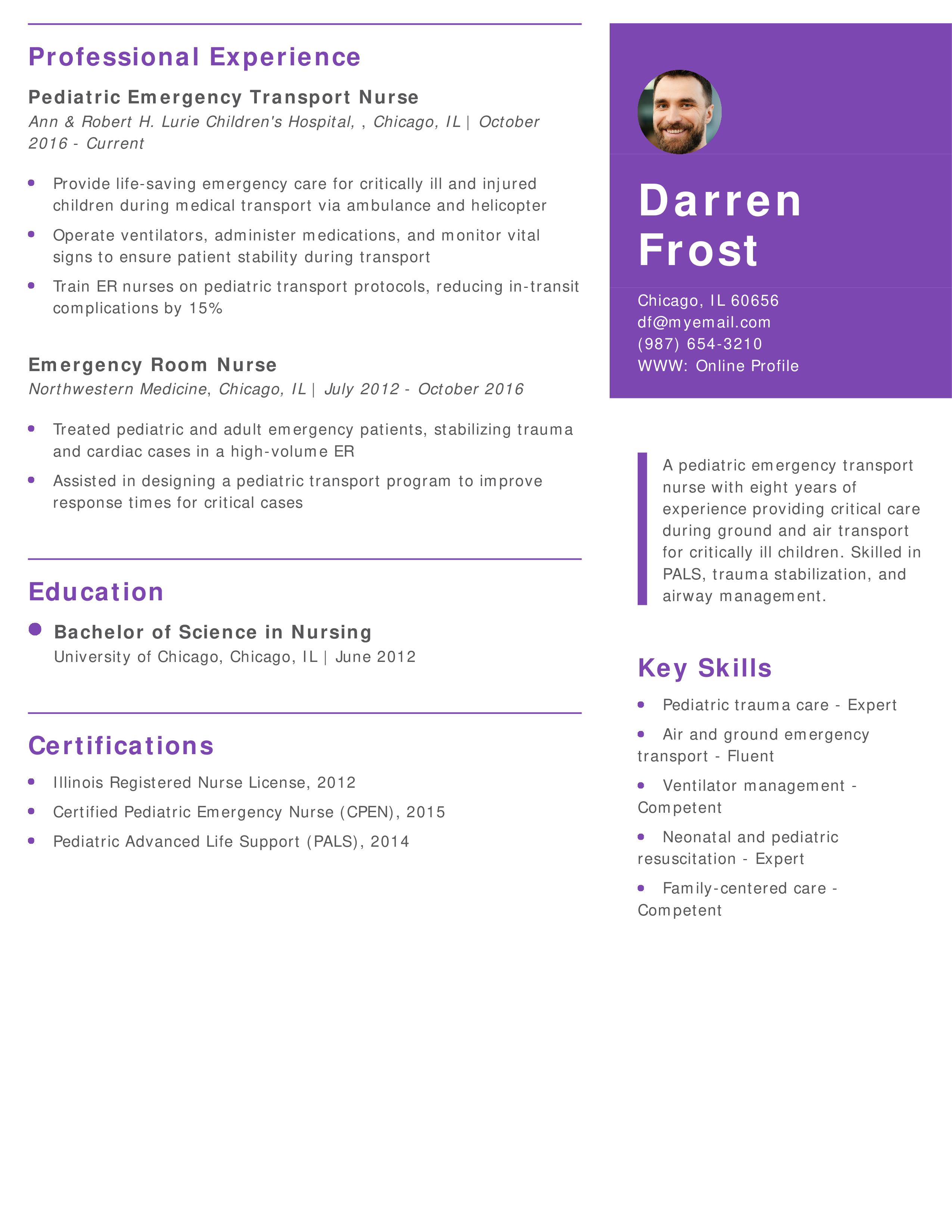
Why This Resume Is a Great Example
Darren’s resume highlights his expertise in pediatric emergency transport, showcasing his ability to handle critical situations while ensuring safe medical transfers.
Key Tips: Emphasize specialized training: Pediatric transport requires advanced skills in neonatal and pediatric resuscitation. Show measurable achievements: Reducing in-transit complications by 15% demonstrates expertise and leadership.
For additional resume insights, check out: How To List Certifications on Resume
Our templates are crafted by professional resume writers to make creating your resume quick, easy, and effective.
- Professional resume template downloads
- Customized cover letter generation
- AI resume writing support
- Career-building resources and advice
Emergency Room Nurse Text-Only Resume Templates and Examples
How To Write an Emergency Room Nurse Resume
1. Write a dynamic profile summarizing your emergency room nurse qualifications
Create a profile section that encapsulates your strongest qualifications and experience as an ER nurse. Capture the hiring manager’s attention early in your resume by focusing on your value to the clinical teams, patients, and health care organizations. Paint a picture of yourself as a nursing professional by demonstrating your passion for patient-centered care and health care equity. Incorporate specific skill sets from the job description to show prospective employers that you’re the ideal candidate.
Senior-Level Profile Example
A senior ER nurse with over 10 years of experience specializing in delivering emergency medical treatment to patients in intensive care units (ICU) and surgical units. Adept at providing emotional support to patients and families in critical medical situations.
Entry-Level Profile Example
A patient-centered ER nurse with three years of experience treating diverse patient populations in ER departments. Adept at communicating effectively with distressed patients and coordinating with multi-disciplinary teams to deliver quality care.
2. Create a powerful list of your emergency room nurse experiences
Your professional experience section should clearly describe your abilities and experience. Quantify your achievements to establish a sense of scope for the hiring manager. For example, consider mentioning nurse-patient ratios, patient satisfaction ratings, and frequently used procedures or equipment.
Highlight your efforts to reduce wait times and enhance clinical efficiency in fast-paced hospital environments. Demonstrate an ability to improve quality of life and deliver quality care in critical medical situations. If you lack experience in an ER environment, list previous nursing accomplishments and responsibilities that will support you in your new position.
Senior-Level Professional Experience Example
Senior Emergency Department Nurse
Salem Health Hospitals & Clinics, Salem, OR | September 2016 – present
- Perform initial assessments of patients with the most serious illnesses and injuries, including those involved in road traffic collisions
- Communicate care plan information to patients’ families and help them process distressing information, receiving over 97% positive feedback throughout employment
- Assist doctors with emergency procedures and closely monitor patients’ vital signs, promptly reporting any causes for concern
Entry-Level Professional Experience Example
Emergency Room Nurse
Beebe Healthcare, Dover, DE | July 2019 – present
- Deliver patient-centered care in a 240-bed hospital with a 1-to-6 ratio, administer oral medications, monitor symptoms, and gather patient medical information
- Support patients with empathy and compassion to preserve privacy and dignity throughout treatment, resulting in a 91% satisfaction rating
- Administer wound care, collect urine and blood samples for laboratory testing, monitor vital signs, and alert physicians to changes in patient condition
3. Include emergency room nurse-related education and certifications
Nursing, like many health care occupations, requires several certifications; some may be mandatory to your role as an ER nurse and others highly desirable. Start by listing any required education and licensure as stated on the job posting. Then, include specialty training to help you stand out from the competition, such as certification in emergency nursing, basic life support (BLS), and pediatric life support. Use the examples below to help you format this space correctly.
Education
Template
- [Degree Name]
- [School Name], [City, State Abbreviation] – [Graduation Month and Year]
Example
- Bachelor of Science in Nursing
- University of Utah, Salt Lake City, UT – June 2010
Certifications
Template
- [Certification Name], [Awarding Organization], [Completion Year]
Example
- Advanced Practice Registered Nurse Certification, State of Utah, 2012
4. List key skills and proficiencies for emergency room nurses
A clear, concise list of your abilities makes it easy for the hiring manager to determine if you can meet their needs and bring value to clinical teams. Choose words and phrases specific to ER nursing and provide a mix of both medical and interpersonal skills. As an additional strategy, use this space to match particular terms or phrases listed in the job description to ensure compliance with applicant tracking systems (ATS). Here are some suggestions for desirable ER nursing skills.
| Key Skills and Proficiencies | |
|---|---|
| Acute care | Advanced cardiac life support |
| BLS | Clinical operations |
| Communication | Compassionate care |
| Conflict resolution | Crisis prevention and intervention (CPI) |
| Electronic Health Records (EHR) | Emergency medical care |
| ER operations | ICU |
| Inpatient care | Medication administration |
| Pain management | Patient care |
| Patient-centered care | Triage |
| Treatment planning | Wound care |
How To Pick the Best Emergency Room Nurse Resume Template
When reviewing resume templates for an ER nurse, choose a layout and design that is clean and easy to read. You only have a few seconds to make an impression, so avoid distracting colors and graphics that may draw the reader’s eye from your content. Use a single-column template with an elegant font to control the flow of information and allow the hiring manager to scan your resume easily.
Frequently Asked Questions: Emergency Room Nurse Resume Examples and Advice
What makes an Emergency Room Nurse CV stand out to recruiters?-
An Emergency Room Nurse CV stands out by clearly demonstrating your expertise and achievements in the field. Be sure to use measurable outcomes and include quantifiable results wherever possible. Show how your contributions directly impacted the company, whether it’s through cost savings, operational efficiency, or revenue growth. Keep the layout clean and easy to navigate, focusing on relevant experience.
What are common action verbs for emergency room nurse resumes?-
Action verbs excite your writing by immediately engaging the reader and reducing the need for nonessential words. They also help your resume meet the search parameters of automatic tracking programs and human reviewers. However, developing unique action verbs as you write your resume can be challenging. Check out our list of verbs common to nursing careers, emphasizing the role of an ER nurse:
| Action Verbs | |
|---|---|
| Administer | Advocate |
| Assess | Collaborate |
| Communicate | Coordinate |
| Counsel | Deliver |
| Diagnose | Educate |
| Improve | Lead |
| Manage | Monitor |
| Perform | Plan |
| Prioritize | Support |
| Train | Treat |
How do you align your resume with an ER nurse job description?-
According to the Bureau of Labor Statistics, jobs for registered nurses (RNs) are expected to grow by 6%, or almost 191,300 jobs, from 2022 to 2032. Although not all RNs work in an ER, the U.S. has a growing population and the CDC has found that ER visits are on the rise, so there will likely be a continued demand for nurses with trauma and critical care experience. That being said, align your resume with the job posting to maximize your chances of landing the interview.
For example, if a hospital’s mission statement mentions diversity, equity, and inclusion (DEI), you’d emphasize your experience delivering patient-centered care to diverse populations. If a health care organization is seeking an ER nurse with strong leadership capabilities, highlight your background training and mentoring nursing professionals. Tailor your resume to each opportunity you apply for to accelerate your job search.
What is the best emergency room nurse resume format?-
Reverse chronological is the ideal format for ER nurses. This approach ensures that your most recent nursing experience is featured towards the top of your document. Avoid functional resumes, even at the entry level, as this format lists relevant skills but fails to tell your unique story as a health care professional. If you’re a recent graduate, focus on your experiences treating patients as a nurse extern rather than only listing your health care qualifications.
How many pages should my emergency room nurse resume be?-
Generally, an emergency room nurse resume should be one page for candidates with fewer than 10 years of experience. A two-page resume is acceptable if you’re a seasoned professional with extensive accomplishments—but only if it provides meaningful details that strengthen your application. Tailor your content to the job, focusing on your most relevant qualifications.
Work history should typically cover the last 10 to 15 years. Older positions can be excluded or briefly summarized unless they’re highly relevant. A concise, focused resume demonstrates your ability to prioritize and communicate effectively.

Craft your perfect resume in minutes
Get 2x more interviews with Resume Builder. Access Pro Plan features for a limited time!
